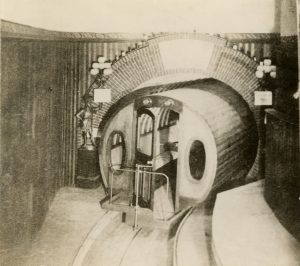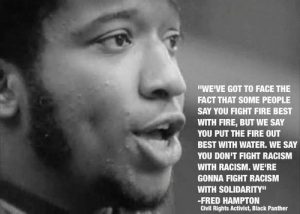Winner of the Spring 2017 StMU History Media Awards for
Best Article in the Category of “People”
On January 30, 1933, Adolf Hitler was appointed Chancellor of Germany. Hitler quickly turned Germany’s fragile Weimar democracy into a one-party dictatorship. During his rule, Hitler pursued a plan to harass one half-million German Jews to leave Germany. Hitler promoted a “master race” scheme that sought to keep the so-called Aryan race pure from racial contamination from all other races he deemed to be inferior. This Aryan race consisted of only Germanic peoples who had the characteristics of blond hair, blue eyes, and light colored skin. Three years after taking power, Hitler hosted the 1936 Olympics in the German capital of Berlin. This was his opportunity to put his “New Germany” on display for all the world to see.

As Hitler’s Nazi government prepared for these Olympics, athletes from the United States were also preparing themselves for the coming competition in Berlin. In the United States, African Americans were dealing with their own problems of racism. Not only was life hard as an African American in the 1930s, but life was even harder as an African American athlete. One African American, who would later become one of the most famous athletes in the history of Track and Field, was James Cleveland “Jesse” Owens. At the age of eight, he had moved to Cleveland, Ohio with his family, who had sought for better work and educational opportunities. “On his first day of school, he introduced himself as ‘J. C.,’ but his teacher misunderstood him to say “Jesse.” The young Owens bashfully accepted the mistake, thus taking on the name by which he would become famous.”1 Jesse Owens would grow up loving to run. He was the fastest runner in his school and loved competing against others. His dream was to attend the University of Michigan, but there were no scholarships offered in those days and his parents could not afford tuition. Instead, he attended Ohio State University, where he worked for the boosters to pay for his expenses.
In the Summer of 1936, at the Olympic trials, Jesse finished first in all three of the events that he competed in. He had trained hard in the preceding months, and the hard training paid off, allowing Owens to attend the Olympics of 1936, known as “The Nazi Games” or as “Hitler’s Games.” In actuality, these Olympic games were not originally intended to be games hosted by the Nazis: the “Nazis were never invited to host the Games—and probably never would have applied to do so. Instead, the International Olympic Committee (IOC) had awarded the Olympics to Germany’s Weimar Republic in 1931 before the Nazi takeover as a way of welcoming Germany back to sports respectability.”2

Ironically, Adolf Hitler knew nothing about sports and expressed little interest in hosting the Olympics; instead he wished to host an all-German athletic celebration. “But Dr. Josef Goebbels, the influential minister of propaganda, glimpsed how Germany might score a tremendous public-relations coup and convinced Hitler to support both the Winter and Summer Games.”3 Influenced by Dr. Josef Goebbels, Hitler used these Olympic games as a political relation with other countries.
Several weeks after the Olympic trials, Jesse Owens competed in the Berlin Olympics and made a name for himself. He won four gold medals, in the 100m, 200m, 4x100m relays, and in the long jump. Jesse Owens had set records and represented America in a humble and most respectable way, considering the circumstances. Even though many have claimed that Adolf Hitler refused to congratulate Jesse Owens, others go further by claiming that Hitler actually “snubbed” Owens:
By the end of that fabulous week in Berlin, an attractive yarn attached itself to the name of Jesse Owens. Supposedly, he was ‘snubbed’ by Adolf Hitler, who reportedly refused to congratulate him publicly after his victories. Actually, the story was concocted by American sportswriters, who were all too willing to read the worst of motives into Hitler’s behavior and to assume innocent excellence from America’s newest hero. Although it had no basis in fact, the story of ‘Hitler’s snub’ was repeated so often that people took it as truth. It remains one of the great anecdotes of American popular culture.4

Racism was as alive in the United States as it was overseas in Germany in the 1930s. German Jews were a persecuted minority in the 1930s, and African Americans were experiencing similar treatments of racism in 1930s America. “World reaction to Hitler’s program resulted in a movement to boycott Nazi goods and services, which included a movement to take away the 1936 Olympics from Berlin in an attempt to force the German government to cease its discriminatory practice against the Jews.”5 It was not until the United States entered World War II that sentiment against racism began to penetrate the American social consciousness. Even though Owens continued to face white racism in his own country subsequent to his Olympic victories, he later reflected on his experiences of racism: “What I’ve done is no more than countless other Negros (and Jews, Poles, Greeks and just Americans in general) have done…. I’ve been a Negro in America for fifty-seven years, and I want to tell you that [being black in America] can be pure hell at times and can shake anyone’s sureness. Often it’s worse if you were the world’s fastest human.”6 When Owens returned to the United States after the Olympics, President Franklin Delano Roosevelt refused to acknowledge his accomplishments or even invite him into the White House. It was not until 1979 that President Jimmy Carter presented Jesse Owens with the Living Legend Award. Forty-three years after his Olympic victories, Jesse Owens had finally been properly recognized for his great achievements.
Despite all the controversy that Jesse Owens encountered while doing what he loved, he is a true representation of perseverance and determination. Jesse Owens passed away in March of 1980 from lung cancer.
- Salem Press Biography Encyclopedia, January 2017, s.v. “Jesse Owens,” by William J. Baker. ↵
- John Rodden and John P. Rossi, “Berlin Stories,” Commonweal 143, no. 13 (August 12, 2016): 25. ↵
- John Rodden and John P. Rossi, “Berlin Stories,” Commonweal 143, no. 13 (August 12, 2016): 26. ↵
- Salem Press Biography Encyclopedia, January 2017, s.v. “Jesse Owens,” by William J. Baker. ↵
- D. A. Kass, “The Issue of Racism at the 1936 Olympics,” Journal of Sports History, no. 3 (1976): 223. ↵
- Joseph Boskin, “Jesse Owens: Running in the American Dilemma,” Review in American History, no. 3 (1987): 457. ↵



161 comments
Jasmine Jaramillo
There are many stories to be learned from World War II. I remember learning about the Olympic games in Berlin when I was younger. It’s always cool to relearn the information from a different perspective. In this case, through Jesse Owens experience. I think it’s amazing that Owens didn’t just set one but four world records during the Games. Owens is truly a great man and so strong internally. Just imagine making the greatest achievement of your life and then going home and not getting recognized for it. I really enjoyed how the article not only told Owens story but also told of what was going on in both Germany and America at the time.
Benjamin Voy
What a great article. I have never heard of Jesse Owens however I was extremely intrigued how you were going to link him and Adolf Hitler together. This article definitely delivered, I was hooked after the introduction. I loved how you brought their two worlds together and how Jesse Owens used all of the negative energy around him to boost his career and how he pushed through and accomplished everything he did. Fantastic article
Ashley Tumlinson
Great article! I had not heard of Jesse Owens before this article. Your title grabbed my attention right away… I wondered what such a horrible man like Hitler would have in relation to an Olympic runner. You did a beautiful job at connecting the two worlds. It is truly admirable the way he used all the negative around him to push through and persevere personally, and a shame that they didnt recognize a significant figure.
Clarissa Bustamante
Jesse Owens was such an amazing and inspiring athlete. It is pretty amazing how Jesse Owens was able to go to college and run track and make a career out of it by going to the Olympics due to the fact that it was very difficult for African-Americans to do something like that at the time. I really dislike how President FDR refused to give Jesse Owens the acknowledgement of the success he made in the Olympics because he really did make a huge different. But it is great how he was awarded with the Living Legend Award.
Troy Leonard
prior to reading this article I knew a little bit about Jesse Owens. he’s someone that people can look up to if they ever need a reason to keep doing what they love no matter what others think. the title is what caught my attention because I would have never thought how a person that was in the Olympics and Hitler would be in the same sentence.
Carlos Aparicio
Right away the title pulled me into this article. I had never heard of this American Hero until now and all I can say is that I am starstruck by how amazing his Olympic story was. It is a shame that Hitler and President Franklin D. Roosevelt didn’t bother to acknowledge him for his success. This was a very interesting article to read and the way Jesse Owen’s timeline was put, was a success.
Sebastian Castro Ramos
It is inspiring how Jesse endured the torment of racism in his country, and on Germany, even when he was such an outstanding athlete. He persevered on his dream of competing and winning an important event like the Olympics. What calls my attention about the article is the fact that the press created the story about Hitler not recognizing Jesse in order to make the general public view the Nazis as racists and evil, but when Jesse returned to the United States he did not receive recognition from his president.
Amanda Figueroa
I have never heard of Jesse Owen before, but this article was very informative and descriptive. I learned about him and what he had to go through. He deserved way more recognition than what he got at the time. This article definitely deserved the award because it explained so well the racism and suffering. His name is not even Jesse and he had to go with it.
Eduardo Foster
I enjoy reading this article! The comparison you made on how racism in Germany was with Jews and in the United States with African Americans is amazing. It’s actually a very inspirational story to follow your dreams no matter the challenges you have to face in life. I’m glad that they gave him credits for his accomplishments done in the 1936 Olympics, even though not the way it should have been done.
Mariah Cavanaugh
This article does a good job of expressing how for people of color America wasn’t all that different from Nazi Germany. Jesse Owens represented America with great honor and was snubbed by the leader of Germany, but also by his own leader as well. That Jesse Owens was willing to represent a country that would treat him so poorly says a lot about him as person. This article was a very compelling way to bring that home through the view point of an American hero.